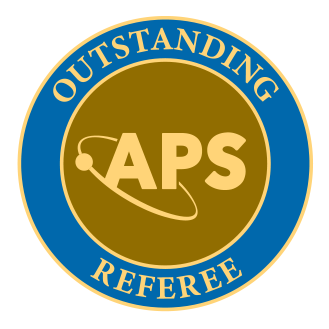| Volume 20, Issue 1 (partial) January - June 2024 | | Advertisement  | In this year, 2024, 156 Outstanding Referees were selected from the 91,600 currently active referees. The honorees come from over 42 different countries and will be recognized at the upcoming March Meeting. Read more. | | | | | |
Advertisement Don't miss these exciting Physical Review Journals events at the 2024 APS March Meeting | | | Advertisement | In the newly released Careers 2024, job seekers can find up-to-date information on career development and career paths in physics, career advice from firsthand experiences, APS career-related programs, and an employer directory of companies currently looking to hire physicists. Please share this free digital resource with your students or anyone looking for career advice. Discover the wealth of opportunities available to anyone with a physics degree. View it now or request a physical copy. | | | | | | Not an APS member? Join today to start connecting with a community of more than 50,000 physicists. | | | | Charles Henderson Phys. Rev. Phys. Educ. Res. 20, 010001 (2024) – Published 16 January 2024 | | | Yangqiuting Li and Chandralekha Singh Phys. Rev. Phys. Educ. Res. 20, 010101 (2024) – Published 16 January 2024  | Good model fit alone is not sufficient to verify the causal structure of a statistical models; additional evidence is required. | | | | | | Danny Doucette and Chandralekha Singh Phys. Rev. Phys. Educ. Res. 20, 010102 (2024) – Published 30 January 2024  | Indicators and causes of gender inequities within educational physics labs and how to reduce them. | | | | | | Cedric Linder, Jesper Bruun, Arvid Pohl, and Burkhard Priemer Phys. Rev. Phys. Educ. Res. 20, 010103 (2024) – Published 5 February 2024  | Students develop representational competency synergistically with the development of ways to communicate about these representations. | | | | | | Christopher Wheatley, James Wells, and John Stewart Phys. Rev. Phys. Educ. Res. 20, 010104 (2024) – Published 6 February 2024  | Modified module analysis revealed communities of answers to the Brief Electricity and Magnetism Assessment based on incorrect answers and the structure of the instrument itself. | | | | | | Ebba Koerfer and Bor Gregorcic Phys. Rev. Phys. Educ. Res. 20, 010105 (2024) – Published 12 February 2024  | The strong reliance on idealized toy models to illustrate concepts in statistical mechanics may not be sufficient to support high quality student learning. | | | | | | Ellen Watson and Gregory Thomas Phys. Rev. Phys. Educ. Res. 20, 010106 (2024) – Published 15 February 2024  | Novel means of analyzing interview data to construct profiles to describe epistemic beliefs on physics knowledge. | | | | | | Daniel Laumann, Julian Alexander Fischer, Tatjana K. Stürmer-Steinmann, Julia Welberg, Susanne Weßnigk, and Knut Neumann Phys. Rev. Phys. Educ. Res. 20, 010107 (2024) – Published 16 February 2024  | Open-ended tasks, while useful for in-person physics courses, should be used less frequently in completely online courses. | | | | | | Paul R. DeStefano and Ralf Widenhorn Phys. Rev. Phys. Educ. Res. 20, 010108 (2024) – Published 20 February 2024  | Investigating an optical phenomenon during pandemic remote learning supports experimental design and modeling skills. | | | | | | Editors' Suggestion Giulia Polverini and Bor Gregorcic Phys. Rev. Phys. Educ. Res. 20, 010109 (2024) – Published 23 February 2024  | ChatGPT does well at proposing productive strategies for solving problems on the test of understanding graphs in kinematics, but does poorly at getting correct answers due to limited ability to visually interpret graphs. | | | | | | Yangqiuting Li and Eric Burkholder Phys. Rev. Phys. Educ. Res. 20, 010110 (2024) – Published 27 February 2024  | Using gradational measures of femininity, masculinity, and androgeny one finds that physics students perceptions differ from binary gender of men and women. | | | | | | Featured in Physics Liam G. McDermott, Nazeer A. Mosley, and Geraldine L. Cochran Phys. Rev. Phys. Educ. Res. 20, 010111 (2024) – Published 29 February 2024  | Neurodivergent students experience unnecessary barriers to success in physics from assessment that is not constructed for how neurodivergent physicists perform physics-related tasks. | | | | | | | |


No comments:
Post a Comment